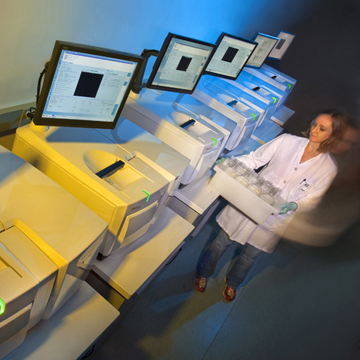Sandia researchers and others at the University of New Mexico (UNM), the Joint BioEnergy Institute (JBEI), Novozymes, and North Carolina State University’s Center for Integrated Fungal Research (NCSU-CIFR) have received a DNA sequencing award from the DOE Joint Genome Institute (JGI) to study microbial genes in arid grasslands. The research combines interests in fundamental microbial ecology with DOE goals to exploit microbes in the production of biofuels.

“This award positions a very talented team to collaboratively apply DOE’s unique facilities in genomics and systems biology to the important challenge of sustainable bioenergy production,” says Grant Heffelfinger (8630), manager of molecular and computational biology. “We normally think of biofuels-relevant ecosystems as those where substantial amounts of biomass are produced and broken down, but this is an excellent example of the relevance of biodiversity across ecosystems — both for the advancement of systems biology as well as biofuels production.”
MORE THAN 400 genome sequencing instruments (some shown here at the Joint Genome Institute’s Walnut Creek, Calif., headquarters) are among the platforms to be used in the grasslands project. (Photo courtesy of Roy Kaltschmidt, Lawrence Berkeley National Laboratory)
Microorganisms in arid land ecosystems have evolved high-efficiency recycling systems to cope with severe nutrient scarcity, extreme temperatures, and low water availability. Genes underlying these adaptations offer great potential in industrial-scale processes designed to convert plant material cheaply and efficiently into biofuels.
The project’s sequencing effort will focus on microorganisms associated with the roots of a common grass species, blue grama, and will interface with ongoing environmental change experiments at UNM’s Sevilleta Long Term Ecological Research site in central New Mexico.
“This award will enable us to better understand the metabolic potential of microbial communities native to extreme environments,” says Don Natvig, professor of biology at UNM. “This understanding can in turn be applied to real-world problems, such as biofuels production inefficiencies and greenhouse gas management technologies.”
Biofuels research and environmental change studies are united by the urgent need to develop sustainable energy sources, and to understand and mitigate the environmental effects of spiraling greenhouse gas emissions. In terms of renewable energy, the study will drive the commercial development of new products useful in the breakdown of lignocellulosic biomass, the starting material for production of biofuels.
From an environmental sciences perspective, the award will enable researchers to study and monitor the effects of altered patterns of fire, precipitation, increasing temperatures, and atmospheric pollution on ecosystem structure and function.
The scientific team includes Amy Powell and Bryce Ricken (both 8622) from Sandia; Don Natvig, Scott Collins, Robert Sinsabaugh, Andrea Porras-Alfaro, and Diego Martinez from the UNM Department of Biology; Blake Simmons (8625) of Sandia and JBEI; Ralph Dean of NCSU-CIFR; and Randy Berka of Novozymes.
Advancing green technology innovation
“It is tremendously exciting for us to establish a genomics-based research program at Sandia to study the value of microbes endemic to extreme environments for the development of biofuels and in understanding carbon cycling and sequestration. Climate and energy eclipse all other science and engineering issues now, and will for the foreseeable future. Our studies are timely and will advance green technology innovation,” says Amy.
The total sequencing resources allocated to the project by DOE will be the equivalent of that required to analyze several microbial genomes or a significant fraction of the human genome, which contains approximately three billion base pairs of DNA.
Established in 2005, the JGI’s Community Sequencing Program (CSP) provides the scientific community at large with free access to high-throughput sequencing at DOE JGI for projects of relevance to DOE missions. Sequencing projects are chosen based on scientific merit — judged through independent peer review — and relevance to issues in bioenergy, global carbon cycling, and biogeochemistry. For more information, see www.jgi.doe.gov/CSP/index.html.